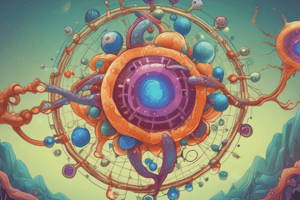Podcast
Questions and Answers
Which of the following is NOT a key characteristic of life?
Which of the following is NOT a key characteristic of life?
- Reproduction
- Metabolism
- Response to stimuli
- Photosynthesis (correct)
What is the primary focus of genetics?
What is the primary focus of genetics?
- The study of heredity and gene variation (correct)
- The study of microorganisms
- The interactions between organisms and their environment
- The investigation of cell structure
Which branch of biology examines the processes of growth and development in organisms?
Which branch of biology examines the processes of growth and development in organisms?
- Microbiology
- Developmental Biology (correct)
- Zoology
- Molecular Biology
What does the Cell Theory state?
What does the Cell Theory state?
Which concept refers to the ability of an organism to maintain a stable internal environment?
Which concept refers to the ability of an organism to maintain a stable internal environment?
Flashcards
Biology Definition
Biology Definition
The scientific study of life and living organisms.
Cell Theory
Cell Theory
All living things are made of cells and all cells come from pre-existing cells.
DNA Purpose
DNA Purpose
DNA carries genetic instructions for organisms.
Metabolism Definition
Metabolism Definition
Signup and view all the flashcards
Homeostasis
Homeostasis
Signup and view all the flashcards
Study Notes
Introduction to Biology
- Biology is the scientific study of life and living organisms, including their structure, function, growth, origin, evolution, distribution, and taxonomy.
- It encompasses a broad range of disciplines, from molecular biology to ecology.
- Key characteristics of life include:
- Organization
- Metabolism
- Growth and development
- Adaptation
- Response to stimuli
- Reproduction
- Homeostasis
Branches of Biology
- Cell Biology: Studies the structure and function of cells, the basic units of life.
- Genetics: Focuses on heredity, genes, and variations.
- Molecular Biology: Investigates the biological processes related to molecules.
- Developmental Biology: Examines the processes of growth and development.
- Evolutionary Biology: Studies the evolution of life.
- Ecology: Explores the interactions between organisms and their environment.
- Physiology: Investigates the functions of organisms at various levels.
- Biochemistry: Investigates the chemical processes within and related to living organisms.
- Microbiology: Studies microorganisms such as bacteria, viruses, fungi, and protozoa.
- Zoology: Focuses on animals.
- Botany: Focuses on plants.
- Paleontology: Studies prehistoric life.
Basic Biological Concepts
- The Cell Theory: All living things are composed of cells, and all cells come from pre-existing cells.
- DNA: Deoxyribonucleic acid, the genetic material that carries the instructions for the development and function of living organisms.
- RNA: Ribonucleic acid, a molecule involved in protein synthesis.
- Protein Synthesis: The process of creating proteins from amino acids using the information encoded in DNA and RNA.
- Metabolism: The sum of all chemical reactions that occur within an organism to maintain life.
- Homeostasis: The ability of an organism to maintain a stable internal environment despite changes in the external environment.
- Evolution: The process by which populations of organisms change over time due to genetic variations and natural selection.
- Taxonomy: The science of classifying and naming organisms.
- Biodiversity: The variety of life on Earth at all levels, from genes to ecosystems.
- Ecosystems: Communities of living organisms interacting with each other and their physical environment.
Levels of Biological Organization
- Atoms: The fundamental building blocks of matter.
- Molecules: Groups of atoms bonded together.
- Organelles: Specialized structures within a cell.
- Cells: The basic units of life.
- Tissues: Groups of similar cells working together.
- Organs: Groups of different tissues working together.
- Organ Systems: Groups of organs working together.
- Organisms: An individual living being.
- Populations: Groups of organisms of the same species living in the same area.
- Communities: Groups of different populations interacting within an area.
- Ecosystems: Communities and their physical environment.
- Biosphere: The global sum of all ecosystems.
Key Biological Processes
- Photosynthesis: The process by which plants and other organisms use light energy to synthesize food from carbon dioxide and water.
- Cellular Respiration: The process by which cells break down food molecules to release energy.
- Reproduction: The process by which organisms create new organisms.
- Growth and Development: The processes by which organisms increase in size and complexity.
- Adaptation: The process by which organisms become better suited to their environment.
- Response to Stimuli: Organisms responding to changes in their environment.
- Inheritance: Passing genetic information from one generation to the next.
Importance of Biology
- Understanding the natural world and the complex systems of life.
- Improving human health through research and medicine.
- Protecting and conserving biodiversity.
- Developing sustainable solutions for environmental problems.
- Understanding the origins and evolution of life.
Studying That Suits You
Use AI to generate personalized quizzes and flashcards to suit your learning preferences.




